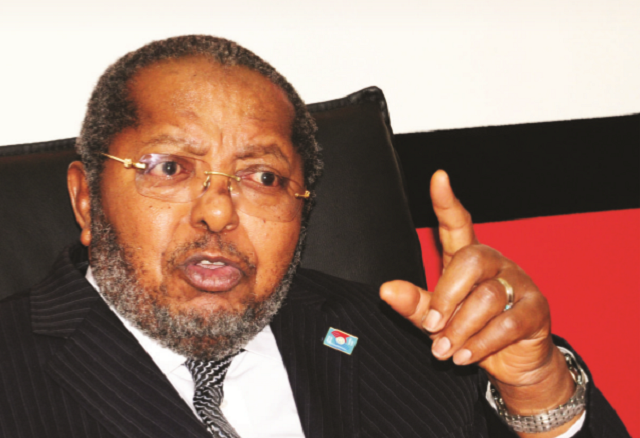
Bank of Uganda Governor Tumusiime Mutebile has written a missive to the Inspector General of Government, Irene Mulyagonja telling her off that her office does not have mandate to give direction to the Bank of Uganda.
This follows Mulyagonja’s letter to the governor, instructing him to stay what she called irregular appointments and transfers at Bank of Uganda. The biggest casualty in the transfers was Executive Director (Supervision) Justine Bagyenda who was sent on early retirement in February.
Bagyenda ran to President Yoweri Museveni who rightly told her that he couldn’t meddle in the affairs of BoU because it is an autonomous body. The IGG issued a directive to Mutebile to stay appointments on March 12 following some affected BoU staff petitioning her. It is understood that Bagyenda was behind this petition.
The IGG instructions were indefinite, “until such a time as the investigation by the inspectorate has been concluded or until this office directs otherwise.”
Mutebile has disregarded the IGG’s orders citing Constitutional mandate that grants BoU autonomy and precedent of court cases that show IGG can’t meddle in affairs of autonomous bodies.
“We have reviewed the contents of the communication and now write to object in the strongest terms to your directive therein, stopping the board of Directors from ratifying the actions and decisions taken by the Governor in relation to the appointments and transfers,” Mutebile wrote back to the IGG in a letter dated March 19.
The letter is copied to H.E The President, the Speaker of Parliament, the Prime Minister, Minister of Finance, Attorney General, Auditor General and BoU Board Members;
Mutebile said that IGG does not have the mandate to give direction to BoU citing Article 162 (2) of the Constitution, which provides that; “In performing its functions, the Bank of Uganda shall conform to this Constitution but shall not be subject to the direction or control of any person or authority.”
“No outsider including your office can interfere with the decisions of Bank of Uganda,” Mutebile emphasised.
It seems this was the basis President Museveni used when Bagyenda ran to him to have her reinstated and Mutebile emphasizes this in his letter to Mulyagonja.
“Neither His Excellency, the President nor the Parliament of Uganda has ever so brazenly directed the Board of Directors of the Governor in the manner set out in your letter. Even the Judiciary has been very careful to protect the Independence of the Bank of Uganda,” he said.
He went to explain why BoU has constitutional autonomy.
“Your impugned directive to the Board not to ratify the Governor’s decisions if implemented would have a catastrophic effect on the financial sector of Uganda and the economy at large.
“The raison d’etre of the independence is not difficult to fathom. The purpose is to ensure that the Bank of Uganda is credible, decisive and to ensure macro-economic stability and confidence in the market. This can only be achieved if the Bank of Uganda is free from external influence, direction or control,” he reasoned.
Mutebile then went legal, pointing out to Mulyagonja that her powers have been subjected to judicial interpretation.
He cited the case of the Livercot Impex Ltd & Another v Attorney General & Another (MISC. CAUSE NO. 173 OF 2010) [2012] UGHC 22 (17 February 2012) in which the High Court reviewed directives of the IGG to the Uganda Land Commission, where Justice Eldad Mwangusya ruled that regardless of whatever powers the Inspectorate of Government derives under the Constitution, it did not have “power to reverse a decision of the Uganda Land Commission which is also established under Article 237 of the Constitution and derives its power from Article 239 of the Constitution.”
“I also do not think that the IGG can reverse the decisions of the Commissioner Land Registration who derives her authority from the Registration of Titles Act,” ruled Mwangushya.
Mutebile based on Mwangushya’s ruling to affirm his position, noting that: “Uganda Land Commission does not have the same constitutional independence and protection as the Bank of Uganda.”
Mutebile cited another case where Mulyagonja was unsuccessful in attempting to interfere with the decisions of the Board of Uganda Development Bank.
“Your ability to issue directives on staff matters to a Board of Directors was extensively reviewed by the High Court in MC 303 of 2013, (Patricia Ojangole & 4 others vs Attorney General). It is worth noting that the Uganda Development Bank is not a constitutionally established entity and does not enjoy the independence extended to the Bank of Uganda and yet that Board was protected from your interference by the Court,” Mutebile wrote.
In the case, the IGG had issued directives to the Board of the Uganda Development Bank to reverse decisions of the Managing Director who had fired bank officers who had been accused of corruption. She had also written a directive to stop some officers from taking up positions in UDB.
“… the Board of Directors have the Supreme disciplinary control over all members of staff and therefore invoking a particular disciplinary procedure against an employee is within the sole discretion and mandate of the Board,” Mutebile quoted Justice Stephen Musoota’s ruling.
“You have taken a similar route against BoU, a constitutional body whose independence is guaranteed and protected by the Constitution, and is therefore much more protected than UDB, for obvious reasons.
Mutebile also cautioned Mulyagonja to go slow on the Central Bank’s matters as her missive undermined BoU’s reputational integrity. “Your presumption of “bad faith” as a basis to take over the Board’s role presupposes you have already formed an opinion, which makes an investigation redundant. But more importantly, this presumption of “bad faith” undermines the Bank of Uganda’s reputational integrity.”
He stated that BoU had disregarded her directive. “BoU shall safeguard its independence an ensure it maintains public confidence in its ability to guarantee a sound financial system free of external interference.”